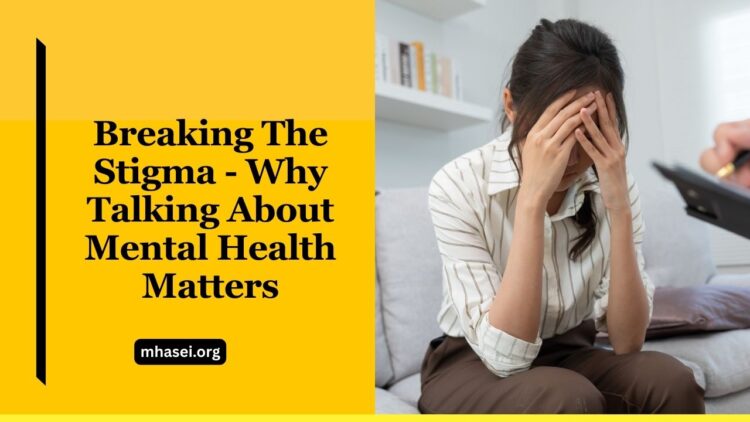In today’s fast-moving world, mental health is just as important as physical health. Yet, many people still face mental health stigma, which means they are judged, ignored, or even treated unfairly when they share their struggles.
This stigma makes it hard for people to ask for help, talk to friends, or visit doctors. By talking about mental health openly, we can create more mental health awareness and build a society where no one feels ashamed for what they are going through.
Why Stigma Around Mental Health Exists
The main reason for stigma is a lack of knowledge. In many cultures, people think mental health issues mean someone is weak or “not normal.” These wrong ideas come from old beliefs and the fear of things people don’t understand.
- Some people believe mental health problems are rare – but the truth is, millions of people deal with stress, anxiety, or depression every day.
- Others think that only certain people suffer from mental health issues – but the reality is anyone can be affected.
- Many fear being judged, so they keep silent.
This silence keeps the mental health stigma alive.
Why Talking About Mental Health Is Important
Talking about mental health is powerful. Here’s why:
- It spreads awareness – When people talk openly, myths and false ideas are replaced with facts.
- It normalizes the conversation – Just like talking about a fever or injury, mental health should be discussed without shame.
- It helps people feel less alone – When someone shares their struggles, others realize they are not the only ones.
- It encourages early help – The more people talk, the easier it becomes to seek therapy, counseling, or medical support.
- It creates stronger communities – Awareness builds empathy and reduces discrimination.
Myths vs Facts About Mental Health
| Myths | Facts |
|---|---|
| Mental health problems are rare | 1 in 4 people may face a mental health issue at some point in life |
| Only weak people have mental health issues | Anyone, even strong and successful people, can face challenges |
| Talking about mental health makes problems worse | Talking helps in healing and creates awareness |
| Therapy and counseling are for “crazy” people | Therapy is a healthy way to manage stress, just like exercise for the body |
How Awareness Campaigns Help Break Stigma
Governments, schools, and health organizations worldwide are now working to fight stigma. Mental health awareness campaigns on social media, TV, and in schools encourage people to talk openly.
- Schools are teaching students about stress, anxiety, and emotional well-being.
- Workplaces are offering mental health days and counseling services.
- Celebrities and athletes are sharing their personal struggles to show that mental health is a universal issue.
These steps show that talking is not a weakness but a strength.
How You Can Help Break the Stigma
You don’t need to be a doctor to help fight mental health stigma. Here are some simple steps:
- Listen without judgment when someone shares their feelings.
- Encourage friends and family to talk about mental health openly.
- Share positive messages about mental health on social media.
- Support awareness events like World Mental Health Day.
- Respect privacy but also remind people that seeking help is okay.
By making these small changes, everyone can play a part in building a more caring and open society.
Breaking the mental health stigma starts with talking about mental health. Silence creates fear, but conversations build mental health awareness and strength. The more we talk, the more we realize that mental health is just another part of human life, not something to hide.
A supportive society allows people to heal, seek help, and live healthier lives without shame. Remember, changing the world begins with simple conversations – and those conversations start with us.
FAQs
Why is mental health awareness important?
Mental health awareness helps people understand common problems like stress, anxiety, or depression, and reduces stigma in society.
How does talking about mental health help?
Talking about mental health breaks the stigma, makes people feel less alone, and encourages them to seek support without fear.
What can I do to support someone with mental health issues?
You can listen with empathy, avoid judgment, and encourage them to get professional help. Small acts of kindness make a big difference.




